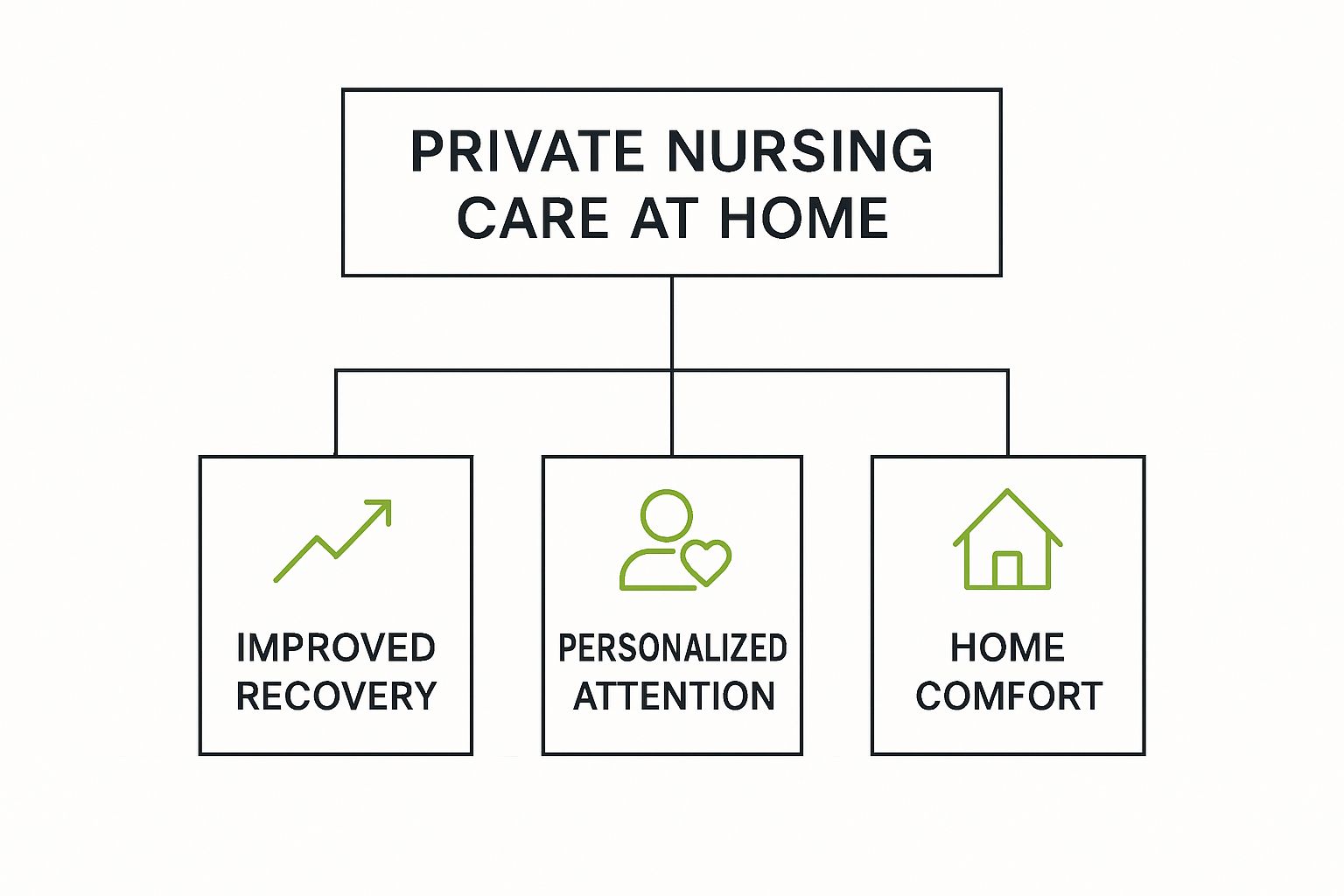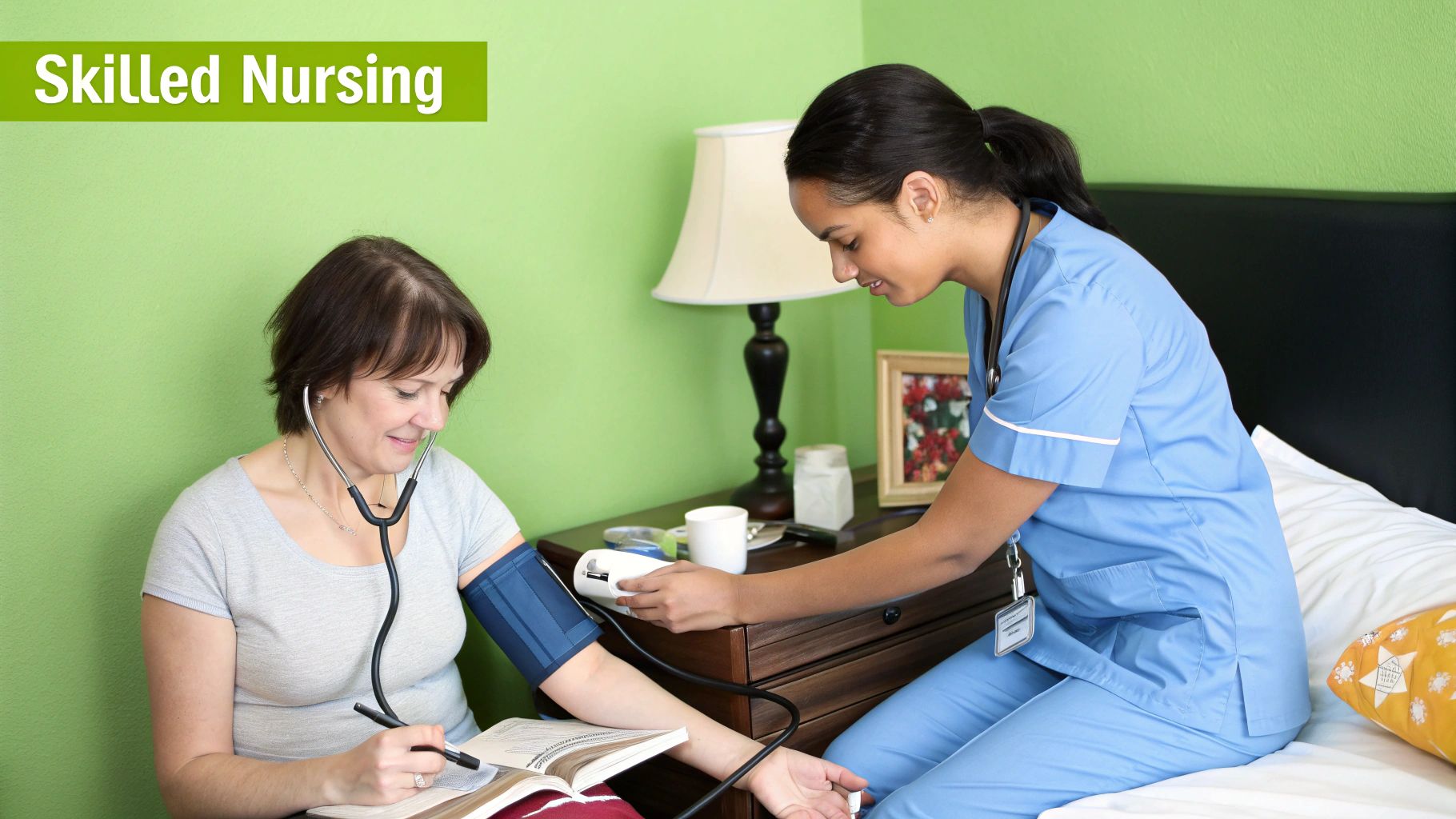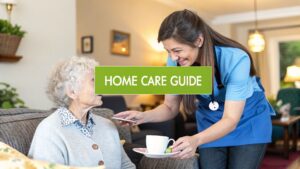When a loved one needs professional medical attention, the thought of a long hospital stay can be stressful for everyone involved. Private nursing care at home offers a comforting and effective alternative, bringing skilled, clinical support right into the familiar surroundings of home.
This isn't about general companionship or help with daily chores. It’s about delivering hospital-level medical care in a personalised setting, tailored specifically to unique health needs.
What Is Private Nursing Care at Home?
Imagine turning your home into a safe, therapeutic space for healing and long-term health management. That’s the essence of private nursing care. It allows a loved one to receive expert clinical skills without sacrificing the comfort and independence that only home can offer.
Think of it as a personalised hospital ward, but instead of a sterile, unfamiliar room, it’s a bedroom filled with cherished memories and belongings. This approach is built on the idea that people recover better and feel more in control when they’re in a place they know and love.
The Clinical Focus of Home Nursing
The key difference between general home care and private nursing is the clinical expertise involved. A private nurse is a registered professional qualified to handle complex medical needs that go far beyond standard assistance.
Their role is fundamentally medical, focusing on tasks that require specialist training.
Key services often include:
- Complex Medical Management: Overseeing serious conditions like respiratory illnesses or neurological disorders that demand constant, skilled monitoring.
- Advanced Treatment Administration: Handling technical procedures such as intravenous (IV) therapy, complex wound dressing, or administering injections.
- Post-Operative Support: Guiding a safe and smooth recovery after surgery, helping to manage pain and minimise the risk of infection or other complications.
The core idea is simple: bring exceptional medical expertise directly to the patient. This empowers individuals to manage serious health challenges or recover from major medical events in the place they feel most secure.
It’s no surprise that the demand for this highly personalised care is growing. The UK domiciliary care sector, which includes private nursing, was recently valued at around £11.5 billion. This huge figure reflects a clear and growing preference for receiving care at home. If you're interested in the numbers, you can find more UK domiciliary care statistics that highlight this shift.
This infographic neatly sums up the core benefits that make private nursing a go-to choice for so many families.

As you can see, it’s the combination of faster recovery, one-on-one attention, and the sheer comfort of being at home that creates a far better care experience.
Private Nursing Care vs General Home Care
It's easy to confuse private nursing with general home care, but their roles are worlds apart. One focuses on clinical needs, while the other handles daily living support. Understanding the distinction is crucial for finding the right help for your family.
Here’s a simple breakdown to clarify the differences.
| Feature | Private Nursing Care | General Home Care |
|---|---|---|
| Provider | A Registered Nurse (RN) or Licensed Practical Nurse (LPN) with clinical qualifications. | A caregiver or home health aide, often without formal medical training. |
| Core Focus | Medical treatments, health monitoring, and managing complex conditions. | Assistance with daily activities like bathing, dressing, meal prep, and companionship. |
| Key Tasks | Administering medication, wound care, IV therapy, ventilator management, post-op support. | Light housekeeping, running errands, providing transport, and helping with mobility. |
| When It's Needed | For post-surgery recovery, chronic illness management, or conditions requiring skilled care. | For seniors needing support to live independently, or for individuals needing non-medical help. |
| Goal | To stabilise health, promote recovery, and manage medical needs safely at home. | To enhance quality of life, provide companionship, and ensure safety in daily routines. |
Ultimately, private nursing provides a bridge between the hospital and home, ensuring clinical needs are met with precision. General home care, on the other hand, makes daily life easier and more comfortable. Both are valuable, but they serve very different purposes.
What a Private Home Nurse Actually Does
When you think of a private home nurse, it's easy to picture someone offering comfort and companionship. And while that’s part of it, their role goes much, much deeper. They deliver highly skilled clinical care right in your home—the kind of care that would otherwise mean a trip to the hospital.
Think of them as a clinical expert dedicated entirely to one person's well-being. Their duties are hands-on and technical, covering everything from post-operative support to managing long-term health conditions. They are registered professionals who bring a wealth of medical knowledge directly to the bedside.

Complex Medical and Clinical Duties
A huge part of a private nurse's job involves performing complex medical procedures. This is where their advanced training really shines, helping to maintain a patient's health and prevent complications outside of a hospital setting.
Some of their key clinical tasks often include:
- Advanced Wound Care: Managing tricky surgical wounds to prevent infection, changing dressings, and keeping a close eye on the healing process to ensure recovery stays on track.
- Intravenous (IV) Therapy: Administering medications, fluids, or nutrition directly into a vein. It’s a task that requires absolute precision and constant monitoring.
- Catheter and Stoma Management: Providing routine care for catheters or stomas to maintain hygiene and prevent issues, which is vital for a person's dignity and comfort.
- Ventilator and Tracheostomy Care: Supporting individuals with respiratory conditions by managing specialised equipment and ensuring airways remain clear and safe.
Medication and Chronic Disease Management
Getting medication right is fundamental to private nursing care at home. A private nurse makes sure that complex prescriptions, including injections and time-sensitive doses, are given accurately. This takes the pressure off families and dramatically reduces the risk of potentially harmful mistakes.
They also play a massive role in managing long-term health conditions. For someone with diabetes, a nurse might monitor blood sugar levels and administer insulin. For a patient with heart failure, they would track vital signs, manage symptoms, and help the family understand important lifestyle adjustments. Educating patients and their families is a key part of the job, covering everything from managing chronic conditions like prediabetes to promoting healthier habits.
A private nurse does more than just follow a doctor's orders. They act as the clinician in the home, using their judgement to assess a patient's condition, respond to changes, and provide proactive care that prevents emergencies before they happen.
And while their primary function is clinical, the emotional support and reassurance they offer are just as crucial. You can learn more about how companionship is just as important as physical care in our related article. This blend of clinical excellence and compassionate support is what truly defines the role.
The Real Benefits of In-Home Nursing Care
Deciding between a hospital stay and care at home can feel like a huge weight on your shoulders, but the upsides of private nursing care at home go far beyond just being convenient. The biggest plus is the deep sense of comfort and emotional security that comes from healing in your own space. This isn't just a nice thought; studies show that being at home can genuinely lower stress and speed up recovery.
Instead of the cold, impersonal feel of a hospital, you or your loved one can recover in a favourite armchair, surrounded by family photos and familiar comforts. This simple act of being in your own environment helps maintain a sense of normality and control when it’s needed most.

Dedicated One-to-One Personalised Care
One of the most powerful advantages is the dedicated, one-to-one attention from a registered nurse. In a busy hospital, staff are often stretched thin, dividing their time between many patients. With private nursing, the focus is entirely on one person's needs, meaning support is immediate and attentive.
This personalised approach means the care plan isn't just a document—it's a living, breathing guide that adapts to an individual's daily rhythms and preferences. For a closer look at how this works, our guide explains how to find peace of mind at home with personalised care that fits your routine. This level of tailored support builds a strong, trusting relationship between the nurse and the person they're caring for.
The real magic of private nursing is how it blends clinical excellence with deep personal comfort. It’s about getting hospital-grade medical attention without ever having to leave the one place you feel most yourself.
Enhancing Independence and Safety
Staying at home helps people hold on to their independence and dignity. They can stick to their own schedule for waking, eating, and sleeping—things that are often impossible in a regimented hospital. This autonomy is vital for mental and emotional well-being.
On top of that, receiving care at home significantly reduces the risk of picking up hospital-acquired infections. With a single, dedicated caregiver, exposure to germs is kept to a minimum, creating a much safer space for healing.
Here are a few other key advantages:
- Greater Family Involvement: Loved ones can be more involved in the care process, offering emotional support without being restricted by visiting hours.
- Reduced Readmission Rates: Continuous, personalised monitoring at home means potential issues are caught early, often preventing another trip to the hospital.
- Improved Mental Health: The comfort of home helps reduce anxiety and confusion, which is especially important for individuals living with dementia or other cognitive impairments.
Ultimately, private nursing care makes home the best possible place to get better, combining expert medical support with the unmatched comfort of familiar surroundings.
Understanding the Costs of Private Home Nursing
Let's talk about the financial side of private nursing care. It’s a crucial step for any family, and getting a clear picture of the costs helps you plan properly without the stress of unexpected bills down the line. Prices can vary quite a bit, so it's important to understand what you're looking at from the start.
The cost isn't just a single, fixed figure. Think of it more like a bespoke service—the more specialised the requirements, the more the final price will reflect that. The goal is to match the level of care precisely to what's needed, ensuring you only pay for the support that’s genuinely necessary.
Key Factors That Influence the Cost
The final bill for private home nursing is rarely a one-size-fits-all deal. A few key variables come into play, each shaping the overall expense. Knowing what these are can help you anticipate the costs and budget for the right level of care.
Here are the main elements that typically determine the price:
- Complexity of Medical Needs: Someone who needs intensive, specialised support—like ventilator management or complex wound dressing—will naturally have higher costs than a person who just needs basic health monitoring and medication reminders.
- Nurse's Experience and Specialisation: A highly experienced nurse with a specialisation in a field like palliative or dementia care will command a higher rate than a general registered nurse. That expertise is a valuable part of the service you're paying for.
- Intensity and Duration of Care: This is a big one. The number of hours needed per day or week directly impacts the cost. A few hours of support each day will be significantly less expensive than a full-time, 24/7 live-in care arrangement.
- Geographical Location: Care service prices often change depending on where you are in the UK. Costs in London and the South East are typically higher than in the North of England, Scotland, or Wales, which just reflects the regional differences in the cost of living.
The best approach is always to get a detailed assessment from a provider. This lets them build a personalised care plan and give you a transparent, itemised quote based on your specific situation, which helps avoid any financial surprises later on.
It’s also worth remembering that at-home care can be a more positive and often more cost-effective alternative to a residential home. You can find out more about how care at home can positively replace care homes in our detailed comparison.
Estimated UK Private Nursing Care Costs
To give you a clearer financial outlook, it helps to see some general estimates. While these figures are just averages and will change based on the factors we’ve just discussed, they provide a useful starting point for your budget.
Here’s a table outlining the typical price ranges you might expect for private nursing care in the UK.
| Type of Care | Average Hourly Rate (GBP) | Typical Live-in Weekly Cost (GBP) |
|---|---|---|
| Standard Nursing Care | £25 – £40 per hour | £1,200 – £1,800 per week |
| Specialist Nursing Care | £35 – £55+ per hour | £1,500 – £2,500+ per week |
| Overnight/Waking Night | £200 – £300 per night | N/A |
Although these costs might seem high at first glance, it's important to weigh them against the one-to-one, dedicated support your loved one receives. It's also worth exploring potential funding avenues, as support may be available through NHS Continuing Healthcare (CHC) or other local authority schemes if the individual meets the eligibility criteria.
Finding Care Amidst UK Workforce Challenges
When you start looking into private nursing care at home, it helps to understand what's happening in the wider UK care sector. The truth is, demand for skilled care at home is growing fast. With an ageing population and more people wanting to recover in the comfort of their own homes, the system is feeling the strain.
This isn't meant to sound alarming. It's just the reality of the situation, and it highlights why planning ahead is so important. These workforce pressures can sometimes mean longer waits or a bit more of a search to find the perfect nurse right away.

The Scale of the Challenge
To get a real sense of what's going on, the numbers tell a powerful story. The UK's home care workforce is made up of around 809,000 incredible people. But the sector is struggling to hold onto them.
In just one year, 390,000 workers left their jobs, and there are currently 152,000 vacancies that need filling. Looking ahead, experts predict we'll need another 480,000 care workers by 2035 just to keep up. If you're interested, you can explore more home care facts and statistics to see the full picture.
What do all these figures mean for you? Simply put, skilled care professionals are a precious resource. It makes finding a well-organised, reputable agency more crucial than ever.
Navigating a stretched workforce requires a proactive approach. Choosing an established provider with a robust team ensures greater reliability and helps secure consistent, high-quality care for your loved one, even when the sector is under strain.
Why Reputable Agencies Are Key
Working with a well-staffed, professional agency is your best bet for navigating these challenges smoothly. Good providers have solid recruitment processes in place and a pool of qualified nurses they can call on. This cuts down on delays and ensures that if your primary nurse is ever unavailable, a suitable replacement is found quickly and seamlessly.
Here’s why a good agency makes all the difference:
- Consistency of Care: They are pros at managing schedules to provide the uninterrupted support that’s so vital for complex medical needs.
- Vetted Professionals: They do the hard work for you, running thorough background checks and verifying every qualification for your peace of mind.
- Managed Services: They handle all the admin—from payroll to contingency plans—freeing you up to focus on what matters most: your loved one.
This is especially true when you need temporary support, which can be a lifeline for family caregivers. To get a better feel for these options, you might find our guide on what respite care for the elderly is and why it's so important really helpful. By planning ahead and choosing the right partner, you can arrange the excellent care your family deserves with confidence.
How to Find the Right Private Nurse
Finding the right private nurse for a loved one is a deeply personal process. It goes far beyond simply ticking off qualifications on a checklist. You're looking for a clinically skilled professional, of course, but also someone who brings genuine compassion and trustworthiness into the home.
Let’s walk through how to approach this, so you can feel confident you’re finding the best possible support for your family. The journey starts with getting crystal clear on your specific needs. Before you even think about contacting providers, take some time to map out exactly what’s required. Think about the level of medical support needed, how many hours of care are necessary each day, and whether any specialist skills—like experience with dementia or post-operative care—are essential.
Starting Your Search for Reputable Providers
Once you have a clear picture of what you need, it's time to find reputable agencies or independent nurses. A great place to start is by asking for recommendations from your GP, the hospital discharge team, or even trusted friends who have experience with private nursing care at home.
As you research agencies, make sure you prioritise those that are properly regulated and have a solid reputation. It's crucial that your chosen provider is regulated by the appropriate bodies, as this is your guarantee of high standards and safety. In England, for example, providers must be registered with the Care Quality Commission. You can easily check their inspection reports online to see how they measure up. This link shows you what to look for regarding Care Quality Commission (CQC) regulation.
Key Questions and Credentials to Check
When you start making calls, it’s vital to ask the right questions. This first conversation is your chance to get a feel for their professionalism and how they operate.
Here are a few essential questions to have ready for potential providers:
- How do you create and review personalised care plans?
- What’s your process for matching a nurse to a client?
- How do you handle situations where the main nurse is unavailable?
- Can you provide references from other families you’ve supported?
Beyond these initial questions, verifying a nurse's credentials is non-negotiable. It is absolutely your right to ask for proof of their qualifications and professional standing.
A reputable provider will always be transparent about their nurses' qualifications and registration status. Never hesitate to ask for this information, as it’s fundamental to ensuring safe and effective care.
Make sure to confirm the following:
- NMC Registration: The nurse must be currently registered with the Nursing and Midwifery Council (NMC). This isn't just good practice; it's a legal requirement to practise as a nurse in the UK.
- DBS Check: They should have an up-to-date, enhanced Disclosure and Barring Service (DBS) certificate, which is a thorough criminal record check.
- Specialist Qualifications: If your loved one needs help with something specific, like palliative care or complex neurological conditions, ask for evidence of relevant advanced training.
- Professional Indemnity Insurance: Confirm that the nurse or the agency holds adequate insurance cover.
Ultimately, the goal is to find someone who is not only a clinical expert but also a good personality fit. The right nurse will communicate clearly, respect your loved one's dignity, and become a trusted partner on their healthcare journey.
Your Top Questions About Home Nursing Answered
Stepping into the world of private nursing can feel overwhelming, and it’s natural to have questions. To help you move forward with confidence, we’ve put together straightforward answers to some of the most common queries we hear from families.
Think of this as your starting point for getting clear on what private nursing involves.
Is Private Nursing Care Regulated in the UK?
Yes, absolutely. In England, any provider offering private nursing care at home is legally required to register with the Care Quality Commission (CQC). The CQC acts as an independent regulator, inspecting services to make sure they are safe, effective, and high-quality.
Before you make any decisions, it’s always a good idea to check a provider’s latest CQC rating. Similar bodies are in place across the UK—the Care Inspectorate in Scotland, Care Inspectorate Wales, and the RQIA in Northern Ireland—to ensure consistent standards are met everywhere.
Can a Private Nurse Administer Complex Medication?
Definitely. In fact, advanced medication management is one of the core responsibilities of a registered private nurse. They are clinically trained to do far more than just hand out daily tablets.
This includes administering injections, managing intravenous (IV) lines, and overseeing complex medication routines that demand precise timing and dosage. Their expertise ensures that all medications are handled safely and correctly, right in the comfort of your home.
A personalised care plan is a dynamic document, not a static one. It’s created through a collaborative process involving the individual, their family, and the nursing care manager to ensure care remains effective as needs evolve.
This plan is always built on a thorough health assessment to guarantee every medical, emotional, and practical need is covered. For more articles and insights on private home nursing, you might find the Salthea blog helpful.
At Cream Home Care, we are dedicated to providing compassionate, professional care that meets your unique needs. Find out how we can support your family.






